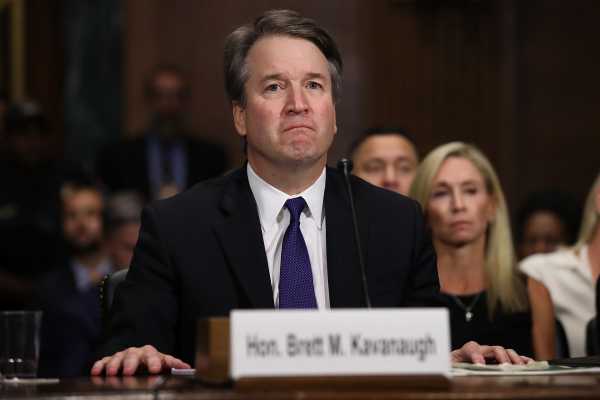
The FBI is investigating Brett Kavanaugh — after the probe into the sexual assault allegations against the Supreme Court nominee was approved on Friday by the White House and Senate Republicans.
But what will the FBI investigation into Kavanaugh actually do?
The FBI’s scope will be limited, both in terms of time and depth. The agency is not looking into the current issue as a criminal matter. The allegations against Kavanaugh, after all, are not federal crimes, but crimes that would normally be left to local and state governments, and crimes that, at this point, the statute of limitation may have expired for.
Instead, the FBI is expanding its broader background check into Kavanaugh. The FBI has carried out these types of background checks in recent years on behalf of the White House, mostly to ensure a federal nominee won’t pose some sort of national security threat. (You don’t want any treason from the country’s highest court or Cabinet members, after all.)
Sexual assault and misconduct accusations generally fall outside the standard background check, which instead typically focuses on interviewing a nominee’s associates and gathering official records that can give insight into a nominee’s public history, involvement in different organizations, and potential conflicts of interest.
This will not, however, be the first time that the FBI looks into sexual misconduct allegations against a Supreme Court nominee. The bureau in 1991 did the same for Clarence Thomas, who is now on the bench, at the request of President George H.W. Bush after Anita Hill said Thomas sexually harassed her when she worked under him in the federal government.
This time around, the FBI is potentially looking into at least three different sexual assault allegations. Christine Blasey Ford said that, at a high school party in 1982, Kavanaugh groped her, tried to undress her, and covered her mouth to muffle her screams, while Kavanaugh’s friend, Mark Judge, stood by. Deborah Ramirez said that Kavanaugh exposed himself to her and pushed his genitals in her face when they both were in college. Julie Swetnick said that in high school, Kavanaugh and his friends used alcohol and other drugs to cause women to “lose their inhibitions” so they could be “gang raped.”
Kavanaugh has denied all of the allegations.
Last Thursday, the Senate Judiciary Committee allowed only Kavanaugh and Ford to testify about Ford’s specific allegations. On Friday, the Senate Judiciary Committee advanced Kavanaugh’s Supreme Court nomination. But that was only under terms that the final vote on Kavanaugh’s nomination would be delayed for a week to allow the FBI to investigate the allegations against him. Without the investigation, three Republican swing votes — Sens. Jeff Flake (AZ), Lisa Murkowski (AK), and Susan Collins (ME) — threatened to vote against Kavanaugh, which would foil his nomination in the Senate.
Still, it was ultimately up to the White House to direct the FBI to look into the matter. Under pressure from the Senate’s swing votes and with the support of Senate Republican leaders, President Donald Trump did that on Friday.
But the scope of the query is being worked out behind closed doors. Whether the FBI’s investigation will amount to much, and whether it will produce much in the way of new or important information, will largely depend on how much leeway the FBI gets from the White House in these closed-door settings.
What the FBI’s Kavanaugh investigation will look into
One way to look at the Kavanaugh investigation is that, in this case, the FBI is effectively a private investigator and the White House is the FBI’s client.
During a typical criminal investigation, the FBI would essentially have free rein. It could pursue any interview with any witness it wants — and it typically would, talking to people who may only be very loosely tied to a set of allegations in order to get as much information as possible. It would chase down every and any loose string, making sure that they were all tied up in case a federal prosecutor brought a case forward. It could even be very proactive, actively looking for new allegations and angles.
And crucially, a criminal investigation could take as long as months or even years — however long the bureau feels is necessary to bring a criminal case that can be proven beyond a reasonable doubt.
With a background check for a Supreme Court nominee, the FBI is much more limited by the White House, its effective client. The White House sets the parameters: who the FBI interviews, the scope of an investigation, what specific allegations the FBI is expected to look into, and how long the background check can take. All of this makes it much more difficult for the FBI to get to the bottom of a case.
“The White House is in control of this. They might make decisions under pressure from the Senate, but they, ultimately, are in control of this,” Asha Rangappa, a former FBI agent, told Sean Illing at Vox. She added, “If the White House shuts it down, there’s nothing the FBI can do. This will be over, no matter what the investigators discover. Because this isn’t a typical criminal investigation, the FBI doesn’t have any independent authority here.”
In fact, the FBI is not expected to get to the bottom of the case. For a criminal investigation, the FBI would typically give a conclusion, based on its interpretation of the facts. But for these kinds of background checks, the FBI does not; instead, the law enforcement agency only provides the information it gathers — names, dates, answers to questions, that kind of thing — and lets the White House and Senate interpret the facts as provided.
While Trump has said that the FBI will have “free rein,” reports from the New York Times and NBC News have suggested that the investigation will be limited, with parameters set by the White House, Senate Republican leaders, and potentially the Republican swing votes in the Senate who are crucial for Kavanaugh’s nomination.
It’s hard to know what exactly is going on with the investigation so far. But there are several major questions about its scope:
- Which allegations is the FBI looking into? The Senate hearing last week only focused on Ford’s allegations against Kavanaugh. It’s likely the FBI will at least pursue that thread. It’s also, based on reports from NBC News and the Associated Press, looking into Ramirez’s allegations. But we don’t know if the FBI will look into Swetnick’s claims, and whether it will investigate any new claims if they arise this week or in the future.
- Who will the FBI interview? The White House originally allowed the FBI to interview Mark Judge, Kavanaugh’s friend; Leyland Keyser, a high school friend of Ford’s; P.J. Smyth, another potential guest at the party where Ford was allegedly assaulted; and Ramirez. But the White House reportedly expanded the probe, according to the Times, to include anyone whom the FBI deems necessary — as long as the investigation is wrapped up within a week.
- Can the FBI track down other information, besides witness interviews? In a criminal case, the FBI would try to get information that goes beyond interviews — records and physical evidence, mainly, that can speak to certain facts. It’s unclear just how much the FBI will be able to do that here. Based on NBC News’s reporting, for example, it seems that the bureau won’t be able to obtain some employment records for Mark Judge that Ford has said would be useful to remembering when the assault against her took place, which remains a major disputed fact in the allegations. But FBI investigators may seek out other records or physical evidence.
- What is the time limit? The Senate, in the agreement hashed out Friday, wants the FBI to carry out a one-week investigation. But the limit is arbitrary, ultimately set by the White House. It’s possible, although unlikely, that the White House would agree to more time if the FBI asks for it.
The answers to these questions could dictate not just what information the FBI reports to the Senate, but whether key swing votes in the Senate for Kavanaugh’s nomination will be satisfied by the investigation. If the senators aren’t satisfied, they’d have the ability, through the threat of their votes, to demand more follow-up by the FBI. But it all hinges on how the FBI inquiry shakes out.
The FBI could uncover information on Kavanaugh that the Senate could not
Before the FBI was directed to look into the Kavanaugh allegations, Republicans on the Senate Judiciary Committee insisted that they alone could look into the allegations and ensure that they were properly investigated. Indeed, that was the purpose of the Senate’s hearings last week involving Kavanaugh and Ford. As Senate Judiciary Committee Chair Chuck Grassley tweeted, “No other OUTSIDE investigation is necessary for the [committee] to do its investigation.”
This claim, however, was a bit of a stretch. While the committee can and does carry out some research and investigations, the committee is no FBI. It just doesn’t have the staff or training to conduct interviews into potential crimes, particularly events that occurred more than three decades ago. The Senate Judiciary Committee’s investigation didn’t even call on Mark Judge, Kavanaugh’s friend, or other accusers besides Ford to publicly testify (although the Senate did get written statements from some people besides Ford and Kavanaugh).
The FBI, on the other hand, is the country’s top law enforcement agency, with decades of history and tens of thousands of employees dedicated to, well, investigating things. (It’s in the name — Federal Bureau of Investigation!)
Even with the limitation that the FBI can’t give a conclusion in this case, it can still do a lot to gather important information, with its expertise and resources, that the Senate Judiciary Committee can’t. As Philip Ewing explained at NPR, this could advantage the FBI in several ways:
We’re already seeing that in action. The FBI, for one, is expected to talk to Mark Judge. In this way, the FBI’s investigation already promises to be more thorough than the Senate’s.
The FBI has investigated alleged sexual misconduct by a Supreme Court nominee before
This is not the first time that the FBI has gotten involved in sexual misconduct allegations against a Supreme Court nominee. It looked into allegations against Clarence Thomas by Anita Hill 27 years ago.
Back then, the investigation mostly played out as it’s expected to now: It took just three days to conduct, and was also focused on interviewing witnesses and collecting basic facts for a report to the White House. The White House, not the FBI, reached a conclusion in favor of Thomas.
Thomas was eventually confirmed, and still sits on the Supreme Court as one of its most conservative members.
Democrats have pointed to the FBI’s Thomas-Hill investigation to argue that the bureau’s involvement wouldn’t be unprecedented. Republicans, meanwhile, have argued that the FBI’s involvement in the allegations against Thomas prove that the bureau is of limited use here, given that the FBI’s findings back then have not vanquished partisan disagreement about the Thomas allegations.
Grassley even invoked a quote from former Vice President Joe Biden, who was chair of the Senate Judiciary Committee as a senator during the Thomas confirmation. Grassley said, “Joe Biden, quote: ‘The next person who refers to an FBI report as being worth anything obviously doesn’t understand anything. The FBI explicitly does not — does not, in this or any other case, reach a conclusion. Period.’”
Biden, however, has argued that he was taken out of context, with a Biden spokesperson telling the New York Times that Biden was responding to claims from Sen. Orrin Hatch (R-UT) at the time that the FBI had effectively exonerated Thomas. (Biden ultimately voted against Thomas’s nomination.)
Biden was right, though, that the FBI doesn’t reach a hard conclusion about whatever it’s investigating in these background checks. That was true for the Hill case, and it’s true for the current accusations against Kavanaugh. That, along with the other limitations, is why the FBI investigation may ultimately be of limited practical value.
The FBI’s Kavanaugh investigation is all for a few swing votes
Regardless of what the FBI reports, the truth is many people have already made up their minds about Kavanaugh.
Much of that is due to disagreement with Kavanaugh’s political and legal positions, which are to the right on issues ranging from abortion to environmental regulation. And part of it is because Kavanaugh is Trump’s nominee; in a highly polarized political environment and with Trump being the most controversial political figure in America, that alone is enough to get people to oppose Kavanaugh — and, in fact, many Senate Democrats came out against the nomination essentially the moment it was publicly announced by Trump’s White House.
But many people have also largely made up their minds on the sexual assault allegations. In the context of #MeToo, Democrats, who are more supportive of the movement, see it as the right thing to believe Kavanaugh’s accusers. Republicans, meanwhile, are much more likely to be skeptical of the #MeToo movement and all the sexual misconduct allegations that have come out of it, seeing the movement as part of a progressive effort to fundamentally alter America to change, among other things, gender norms. So the allegations against Kavanaugh have become part of a broader culture war. (That’s one reason why beliefs about the Kavanaugh allegations are largely split along party lines.)
Sen. Lindsey Graham (R-SC), one of Kavanaugh’s staunchest supporters, exposed the underlying culture issue last week when he explained his vociferous support for Kavanaugh by arguing, “I’m a single white male from South Carolina, and I’m told I should just shut up, but I will not shut up.” This explicitly invoked the racial and gender dynamics involved here.
As Zack Beauchamp explained for Vox, “No longer is this about Brett Kavanaugh and Christine Blasey Ford, or what he may have done to her in suburban Maryland in 1982. It’s about beating back the challenge from feminists and people of color demanding a seat at the table; it is about showing that white men in power are not going anywhere — that they will not listen, will not budge, and will not give ground to #MeToo or the Black Lives Matter movement.”
Unless the FBI digs up some truly revelatory information, none of that is likely to change for most people.
The FBI probe, however, is not for most people. It’s actually for three people: Sens. Collins, Flake, and Murkowski. It took calls by these three Republican senators, despite calls by Democrats and even a majority of the public, for Senate Republicans and the White House to agree to an FBI investigation.
The Senate is closely divided at 51-49 in Republicans’ favor. Assuming that no Democrats cross the aisle to vote for Kavanaugh, this allows Republicans to lose only one vote from their ranks (with Vice President Mike Pence breaking a tie in Republicans’ favor). If just two of the three Republican swing votes crossed over, Kavanaugh’s nomination would likely be done.
Not only could the investigation help the swing votes decide whether they believe the allegations against Kavanaugh, but it could also allow them to save face with constituents and peers by, depending on what the FBI uncovers, giving them political or personal cover for whatever vote they ultimately cast.
In this context, the FBI investigation is more a political exercise than a practical one. That’s why the limits on the investigation, from its scope to how long it can take, may be allowed to stand, even if they stop the FBI from uncovering the full story: The FBI’s query may be mostly in service of getting the votes for Kavanaugh, not really for getting to the bottom of the allegations.
Sourse: vox.com





